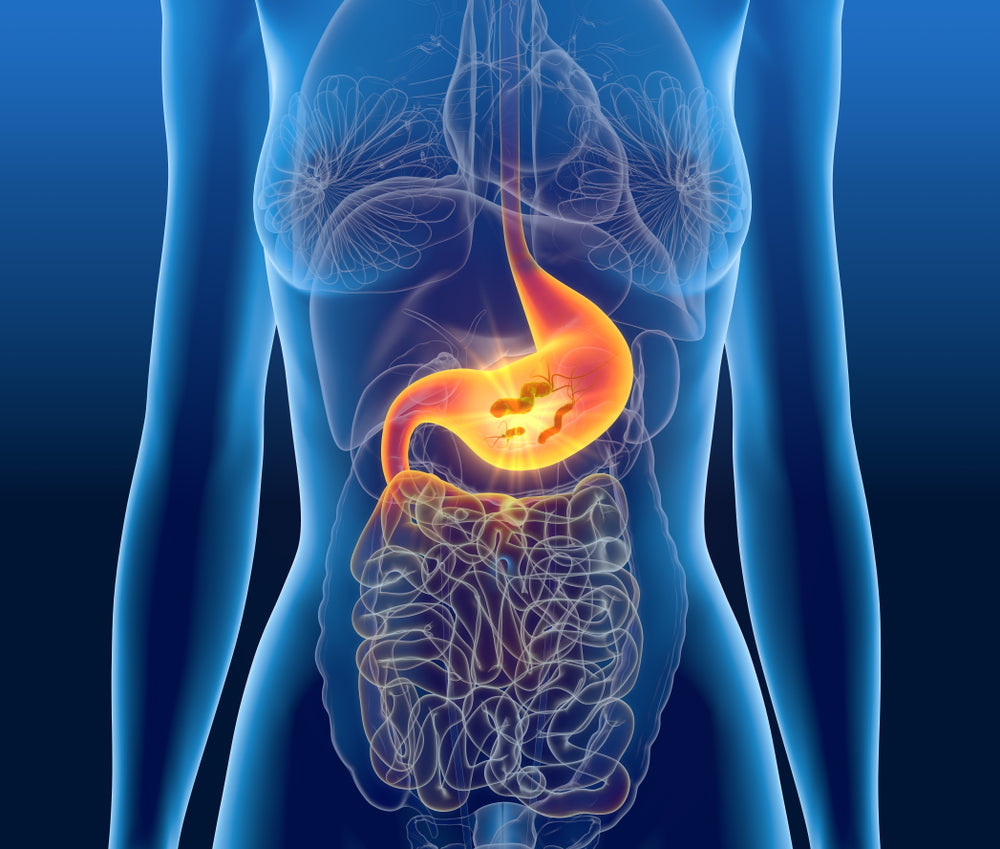Symptoms and Signs of Gastritis and How to Eliminate It

Share
Gastritis is an inflammation of the stomach lining. It can be acute or chronic, and can have a very negative effect on digestive health. It is a fairly common condition with more than 200,000 cases per year in the US alone.
What Causes Gastritis?
Gastritis can have many different causes. Some of the most common causes of gastritis include:
- Infection
- Injury
- Regular use of non-steroidal anti-inflammatory drugs (NSAIDs)
- Alcohol
- Dysbiosis (imbalance in the gut microbiome)
- Inflammation-causing foods
What Are the Signs and Symptoms of Gastritis?
Some of the most common signs of gastritis include:
- Burning ache or pain in the upper belly
- Nausea
- Vomiting
- A feeling of fullness after eating (even small meals)
- Heartburn
- Indigestion
- Burping
- Loss of appetite
Sometimes, there are also no noticeable symptoms. If you notice any of the above signs and symptoms of gastritis, especially if you experience multiple of them, it is recommended to consult with your healthcare provider.
How to Eliminate Gastritis?
The treatment of gastritis will depend on the cause. In some cases, doctors recommend antibiotics and antacids. However, it is really best to understand what the underlying cause is, instead of just suppressing symptoms—as treating the underlying cause is the only way to prevent the inflammation long term.
To understand this condition a bit more, let’s look deeper at exactly what inflammation is.
Inflammation is your body's natural way of protecting itself from infection, illness, or injury. So, inflammation is not a bad thing in itself. The issue arises when inflammation becomes chronic. Chronic inflammation, also referred to as slow, long-term inflammation, lasts for prolonged periods of several months to years. This is the kind of inflammation associated with gastritis, as it is typically not an acute issue but one that persists for months, or even longer if not treated.
What causes inflammation?
Well, there are many things that can lead to inflammation, but some of the most common are:
- Injury
- Infections (bacterial infections, parasitic infections, and Candida overgrowth can all trigger the immune system’s inflammatory response).
- Toxins (pollutants in the environment from contaminated air, water, food, cleaning products, cosmetic products, hygiene products, toxic cookware and household items).
- Certain foods (processed foods, oxidized oils, refined carbohydrates such as white bread and pastries, French fries and other fried foods, soda and sugar-sweetened beverages, red meat, processed meat, margarine, shortening, lard, MSG, and gluten).
- Alcohol
- Cigarette smoke
- Stress
- Radiation
Looking at the causes of inflammation, we may get some insight into why someone might have developed gastritis.
If someone has a gut infection like parasites or Candida (which are much more common than one might think), is exposed to toxins in their environment or food, has a diet high in certain foods like processed meat, white bread, pastries, French fries, soda and gluten, drinks alcohol, smokes cigarettes, and is under a lot of stress—then it would be shocking if they did not suffer from some kind of inflammatory issue.
Yet, these are dietary and lifestyle habits that are extremely common in today’s world. Which, no surprise, is also why many inflammatory diseases like gastritis are on the rise.
So, the first step in getting rid of gastritis is to remove the causes that may be contributing to your gut inflammation. Avoid exposure to toxins the best you can (you can read more about common sources of toxins by reading our article “Detoxification: Everything You Need to Know”).
If you eat any of the problem foods mentioned above, then cut them out of your diet for a while (or indefinitely since they will likely just cause issues down the road). If you drink excessive amounts of alcohol or smoke cigarettes, then stop or cut back. Find ways to manage your stress.
If you are serious about your health and want to get rid of gastritis, then you need to take responsibility over your health and cut out all major causes of inflammation in your life.
Foods to Eliminate Gastritis
In addition to avoiding inflammation-causing foods, you can include anti-inflammatory foods in your diet. Some good anti-inflammatory foods include:
- Berries
- Fruit
- Leafy green vegetables
- Vegetables
- Turmeric
- Lemon
- Avocado
- Olive oil
- Hemp oil
- Fatty fish
- Nuts
- Seeds
Eating more of these foods will help to lower inflammation levels in your body, especially if you’ve removed the common causes of inflammation.
What Will a Doctor Recommend for Eliminating Gastritis?
In addition to removing inflammatory foods and adding anti-inflammatory foods, a doctor may recommend:
- Taking antibiotics
- Taking proton pump-inhibitors to limit the production of acid
- Supplementing with probiotics to replenish good gut bacteria
Takeaway
Gastritis is an inflammation of the stomach lining. It can be acute or chronic, and can have a very negative effect on digestive health. It is a fairly common condition with more than 200,000 cases per year in the US alone.
Gastritis can have many different causes. Some of the most common causes of gastritis include infection, injury, regular use of non-steroidal anti-inflammatory drugs (NSAIDs), alcohol, dysbiosis (imbalance in the gut microbiome) and inflammation-causing foods.
The exact treatment method will vary depending on the cause, but in general it is wise to avoid common causes of inflammation and to consume anti-inflammatory foods, and to take care of your overall gut health. If you have gastritis, or are concerned you might have it, it is best to consult with your doctor.